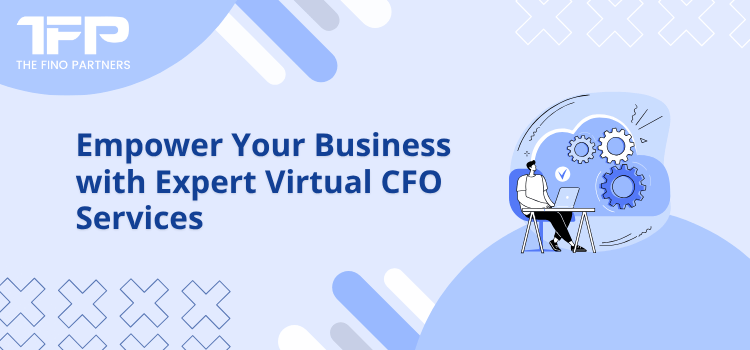Business today is as tough and cutthroat as ever. Start-up firm, growth SME, or established organization, improved money handling and stewardship is the ticket to success in the long term. But it is usually beyond most small- and medium-sized businesses' budget to have an in-house Chief Financial Officer (CFO). Enter the Virtual CFO (vCFO)—a cost-effective, flexible alternative that gives your business top-shelf financial acumen without the cost of a full-time executive.
The world virtual CFO market must be worth $4.71 billion in 2025, up to twice that of during the same to $10 billion in 2035 with 7.82% CAGR. It is fueled by requirements for strategic financial management, new cloud-based technology, and increasing requirements for scalable, on-demand financial leadership.
What Is a Virtual CFO?
A Virtual CFO or vCFO is an experienced financial professional that offers world-class CFO-level service virtually, typically part-time, fractional, or contract-only. A virtual CFO is distinct from a part-time full-time CFO in the fact that it uses technology tools and cloud technology to offer strategic financial advice, planning, and consulting services specifically tailored to the unique needs of your company.
Traits of a virtual CFO:
- Remote Financial Leadership: Looks after your money safely, with cloud-based software.
- Strategic Direction: Offers fact-driven decision-making insight, growth, and risk control.
- Scalable Engagement: Spins up or down to fit your business size.
- Better Costs: Leverages best-of-breed specialists for a fraction of the price of a full-time CFO.
Virtual CFOs are exclusively designed to serve startups, SMEs, and scale-ups in need of finance expertise but without space for a resident CFO.
Core Services Provided by Virtual CFOs
Virtual CFOs deliver various financial services far beyond bookkeeping or accounting. Their primary services are:
1. Strategic Financial Planning & Forecasting
Virtual CFOs prepare robust financial plans in alignment with your business goals. They build challenging forecasting, scenario planning, and long-term financial master plans to assist your business in passing through growth, investment, or expansion stages.
2. Cash Flow Management
Cash flow is the oxygen of every business. vCFOs track, review, and control cash flow cycles so your business is liquid, forward-thinking, and poised to capture new opportunities.
3. Budgeting & Cost Control
The vCFO sets budgets and controls their outlay, recognizes opportunities for cost savings, and imposes lean financial discipline. It therefore means renegotiations with vendors, automation, and cutting unnecessary expenses.
4. Financial Reporting & Compliance
Virtual CFOs provide punctual and accurate financial reporting in the shape of management reports, statutory reports, and regulatory filing. Virtual CFOs set key performance indicators (KPIs) and measurements for performance tracking.
5. Tax Planning & Regulatory Advisory
Expert tax planning decreases your liabilities and maximizes compliance. A virtual CFO makes deductible allowances, maximizes incentives, and positions your finances for maximum tax efficiency.
6. Fundraising & Investment Support
From the preparation of investor presentations to dissecting funding prospects and negotiating contract terms, a vCFO oversees the complexity of capital raises or mergers and acquisitions.
7. Risk Management
vCFOs find, measure, and monitor financial risk so that your business is prepared for market turns and reversals, regulatory shifts, or business disruption.
8. Technology & Automation
They have access to advanced financial software and analytics, which give you real-time intelligence and the benefits of stakeholder collaboration.
Why Companies Are Switching to Virtual CFOs in 2025
Let us understand why companies are now switching to Virtual CFOs in 2025:
1. Cost-Effectiveness
It would cost over $200,000 per year to have an American or European full-time CFO with no bonus and frills. Virtual CFO service is available for as low as $2,000–$8,000 monthly depending on size and complexity. It places the best financial leadership within reach of start-ups and SMEs who could never otherwise afford a traditional CFO.
2. On-Demand Expertise
Virtual CFOs will have a deep background in a limited number of industries and business models and apply best practices and innovative thinking to your company. They work mostly in teams, so you also benefit from a team mentality.
3. Flexibility and Scalability
You can hire a vCFO on retainer, project, or part-time arrangement with up or down flexing services to meet your variable needs. It is particularly ideal for high growth, seasonal, or special projects firms such as restructuring or capital raising.
4. Better Cash Flow and Profitability
Industry data shows that businesses utilizing professional cash flow management and cost control techniques realize a 2–5% average first-year increase in profit margin.
5. Technology Access
Virtual CFOs utilize the latest accounts and analytics software based on the cloud, granting immediate insight into your financial standing and offering data-wise choices.
6. Making Better Decisions
Executives of businesses make better decisions, capitalize on opportunities, and avoid costly errors with timely and accurate financial data and strategic perspective.
Cost Comparison: Virtual CFO vs. In-House CFO
The cost advantage of an in-house virtual CFO is considerable. Here are the figures:
Full-Time CFO:
- Average salary: $200,000+ per year in US/Europe
- Benefits, bonus, overhead: $50,000–$80,000
- Annual cost: $250,000–$300,000
Virtual CFO:
- Monthly retainer: $2,000–$8,000 (based on complexity and scope of work)
- Annual cost: $24,000–$96,000
- No office space requirements, advantages, or long-term job obligation
Savings: Companies save 60–80% with a virtual CFO over a full-time executive but hold top-level expertise.
How Virtual CFOs Propel Business Growth
Virtual CFOs are not bean-counting accountants but rather strategic consultants who assist in growing businesses, innovating, and remaining resilient.
1. Strategic Growth Planning
A vCFO facilitates the establishment of aggressive but realistic finance objectives, the development of growth initiatives, and integration of finance functions with long-term planning. For instance, a growing company competing in international markets can use a vCFO to analyze market riskiness, examine funding choices, and develop a long-term finance strategy for expansion.
2. Funding and Investment
Securing capital is a significant benchmark for most firms. Virtual CFOs guide companies through the minefield of raising loans, equity, or venture capital and make sure each deal aligns with the company's goals and risk appetite.
3. Monitoring Performance
By setting KPIs and benchmarking against industry averages, a vCFO gives you a crystal-clear picture of your strengths and weaknesses. Evidence-based decision-making then guides better choices and accountability.
4. Operational Efficiency
Virtual CFOs spot inefficiencies, optimize processes, and save on cost—typically providing a 10–20% reduction in operating cost in year one.
5. Risk Mitigation
From non-compliance risk to market instability, a vCFO assists you in foreseeing and managing risks, protecting your business from unexpected expenses.
Virtual CFO Market Trends and Stats
The virtual CFO market is hot, and the statistics don't lie:
Market Size:
- $4.37 billion in 2024
- $4.71 billion in 2025
- Projected to reach $10 billion by 2035
Growth Rate:
- 7.82% CAGR between 2025 and 2035
Regional Trends:
- Maximum market share in North America ($2 billion in 2024)
- Europe anticipated to be $3 billion by 2035
Service Segments:
- Financial Planning: $1.5 billion in 2024, growing to $3.5 billion by 2035
- Budgeting: $0.9 billion in 2024, growing to $2.2 billion by 2035
- Cash Flow Management: $1.2 billion in 2024, growing toward a height of $2.8 billion in 2035
- Financial Reporting: $0.77 billion in 2024, going higher to $1.5 billion in 2035.
Business Impact:
- There is a 78% chance that an SME which used virtual CFO services in the past three years gained profitability and financial control (Industry Survey, 2024).
- The market growth is propelled by increasing demand for low-cost, scalable financial stewardship and business sophistication worldwide.
How to Select a Right Virtual CFO Service
Your virtual CFO partner choice does matter. Make the following considerations:
Industry Experience:
Retain vCFOs experienced in your industry. Their cross-industry experience could be valuable.
Service Scope:
Require the provider to provide you with the entire scope of services you require—strategy, reporting, compliance, tax, etc.
Technology Sophistication:
Opt for a vCFO using advanced, cloud-based accounting software for real-time analysis and sharing.
References and Credibility:
Request referrals from customers or case studies to ascertain reliability and success.
Transparency of Pricing:
Describe the fee structure—hourly, monthly, or project—and for unexpected fees.
Communication:
Transparent, proactive communication is the key to a successful partnership.
Scalability:
Your vCFO should be scalable as your business expands or faces new challenges.
Helpful Links
- Signs Your Business Needs a Virtual CFO: Don’t Wait Until It’s Too Late
- Top 5 Pros and Cons of Hiring a Virtual Bookkeeper for Accounting Firms
- Virtual Accounting Services for CPAs: The Future of Firm Operations
The Fino Partners, virtual CFO professional services transform the way businesses manage money, drive growth, and stay ahead of the competition. As the global market doubles in the next decade, there are more and more companies that place a high value on flexible, on-demand financial expertise. With a virtual CFO, you have access to strategic advice, state-of-the-art technology, and cost efficiencies—allowing your business to thrive no matter the economy.




























